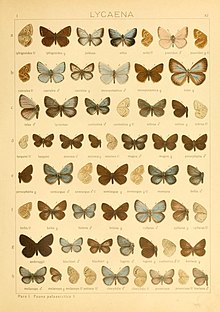You can help expand this article with text translated from the corresponding article in Russian. (April 2023) Click [show] for important translation instructions.
|
Neolysandra coelestina is a butterfly found in the Palearctic that belongs to the blues family.
| Neolysandra coelestina | |
|---|---|

| |
| Neolysandra coelestina in Seitz 82 c | |
| Scientific classification | |
| Domain: | Eukaryota |
| Kingdom: | Animalia |
| Phylum: | Arthropoda |
| Class: | Insecta |
| Order: | Lepidoptera |
| Family: | Lycaenidae |
| Genus: | Neolysandra |
| Species: | N. coelestina
|
| Binomial name | |
| Neolysandra coelestina | |
| Synonyms[2] | |
| |
Subspecies
edit- N. c. coelestina South Europe, NorthTuran, Southwest Siberia
- N. c. alticola (Christoph, 1886) Armenia (highland), Caucasus, Asia Minor, Kurdistan
- N. c. iranica (Pfeiffer, 1938) North Iran
- N. c. saadii Eckweiler & Schurian, 1980 Iran
Description from Seitz
editL. coelestina Ev. (82 c). Male reddish violet-blue (not so deep blue as in our figure), similar in colour to athis with black border and black discocellular spot; hindwing with black marginal dots. Female black brown, with obsolescent reddish yellow submarginal spots. The underside is very characteristical, the hindwing beneath being dusted with bright metallic pale blue from the base close to the margin. In the South Eussian steppes, at Sarepta, Orenburg, etc . in the Caucasus. — alticola Christ, is a smaller form from Armenia with the ocelli of the hindwing beneath obsolescent, the verdigris-dusting occupying nearly the whole hindwing, and with broader border to the upperside of the forewing. In June.[3]
Biology
editThe larva feeds on Melilotus, Trifolium, Anthyllis vulneraria , Vicia cracca
See also
editReferences
edit- ^ Eversmann, 1843 Quaedam lepidopterorum species novae in montibus Uralensibus et Altaicus habitantes nunc descriptae et depictae Bull. Soc. Imp. Nat. Moscou 16 (3) : 535-553, pl. 7-10
- ^ Neolysandra coelestina at Markku Savela's Lepidoptera and Some Other Life Forms
- ^ Adalbert Seitz in Seitz, A. ed. Band 1: Abt. 1, Die Großschmetterlinge des palaearktischen Faunengebietes, Die palaearktischen Tagfalter, 1909, 379 Seiten, mit 89 kolorierten Tafeln (3470 Figuren) This article incorporates text from this source, which is in the public domain.